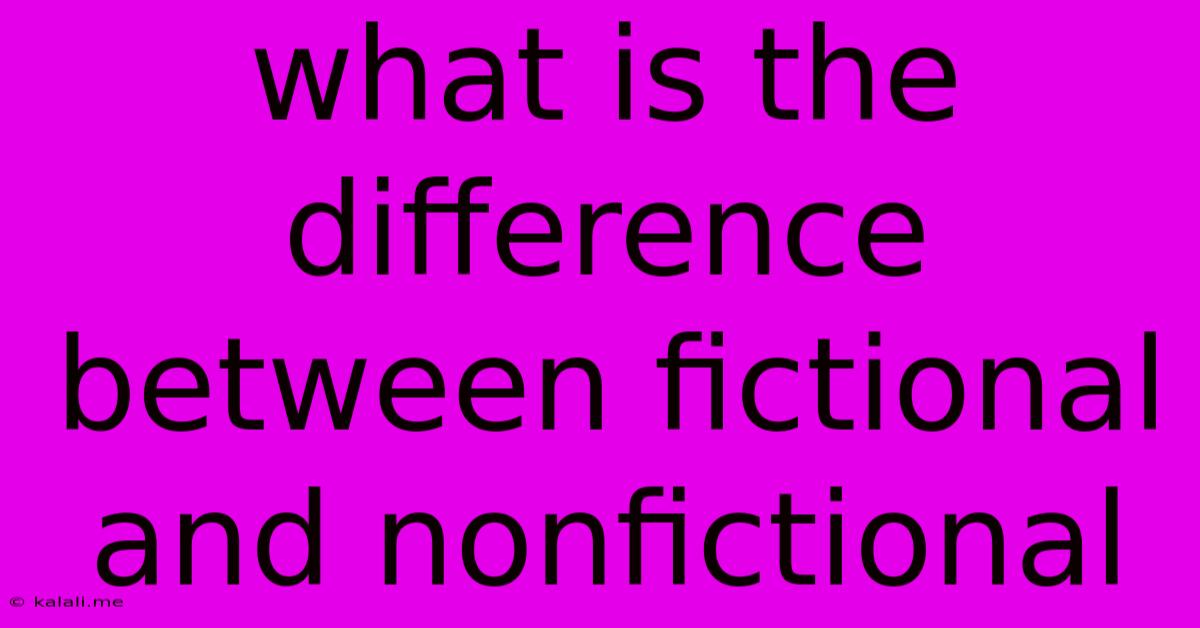What Is The Difference Between Fictional And Nonfictional
Kalali
Jun 12, 2025 · 3 min read

Table of Contents
Delving into the Divide: Fictional vs. Nonfictional Writing
The world of literature and storytelling is vast, encompassing tales both real and imagined. Understanding the core differences between fictional and nonfictional writing is crucial for both readers and writers. This article will explore the defining characteristics of each, highlighting key distinctions and providing examples to solidify your understanding. This will help you navigate the literary landscape with greater confidence and appreciation.
What is Fictional Writing?
Fictional writing, at its heart, is narrative created from imagination. While it may draw inspiration from real-world events or people, the core elements – characters, plot, setting, and conflict – are products of the author's creativity. The author has complete freedom to shape the narrative, invent details, and manipulate events to achieve a specific effect or explore a particular theme. The truth or accuracy of events depicted is not the primary concern.
Key Characteristics of Fiction:
- Imagined Events: The storyline is entirely fabricated, allowing for fantastical elements, impossible scenarios, or alternative realities.
- Created Characters: Characters are inventions of the author, with personalities, motivations, and backstories crafted to serve the narrative.
- Artistic License: Authors have the freedom to bend or break the rules of reality to create dramatic effect or explore thematic ideas.
- Subjectivity: The narrative is presented through a specific lens, shaped by the author's perspective and intentions.
- Examples: Novels, short stories, poems, plays, screenplays, and fantasy literature.
What is Nonfictional Writing?
Nonfictional writing, conversely, aims to represent reality accurately. It focuses on factual information, reporting events that have actually occurred or describing situations and individuals that exist. While the author's perspective and interpretation still play a role, the emphasis remains on presenting verifiable truths and evidence.
Key Characteristics of Nonfiction:
- Factual Accuracy: The primary goal is to present accurate information based on verifiable evidence and sources.
- Real-World Subjects: The subject matter pertains to actual events, people, places, or situations.
- Objective Reporting (Ideally): While complete objectivity is difficult to achieve, nonfictional writing strives for impartiality and avoids deliberate distortion of facts.
- Evidence and Verification: Reliable sources, research, and documentation are crucial in supporting the claims and arguments made.
- Examples: Biographies, autobiographies, historical accounts, news articles, scientific reports, essays, and documentaries.
Blending the Lines: Creative Nonfiction
The line between fiction and nonfiction isn't always clear-cut. Creative nonfiction occupies a fascinating middle ground. It employs literary techniques and storytelling strategies typically associated with fiction, but maintains a commitment to factual accuracy. This genre often blends personal experience with researched information, creating engaging narratives that explore complex themes and experiences in a compelling way. Examples include memoirs, personal essays, and literary journalism.
Conclusion: Understanding the Distinctions
Understanding the fundamental differences between fictional and nonfictional writing allows you to appreciate the unique strengths and purposes of each genre. Whether you're a writer seeking to craft compelling narratives or a reader looking to engage with diverse forms of storytelling, recognizing these key distinctions is essential to a richer and more nuanced understanding of the world of literature.
Latest Posts
Latest Posts
-
Which Term Means Movement Toward The Midline
Jun 13, 2025
-
Which Of The Following Is Not Included In National Income
Jun 13, 2025
-
Where Is Most Of The Mass Of The Atom Found
Jun 13, 2025
-
City College Of San Francisco Acceptance Rate
Jun 13, 2025
-
Average Gpa For Washington State University
Jun 13, 2025
Related Post
Thank you for visiting our website which covers about What Is The Difference Between Fictional And Nonfictional . We hope the information provided has been useful to you. Feel free to contact us if you have any questions or need further assistance. See you next time and don't miss to bookmark.